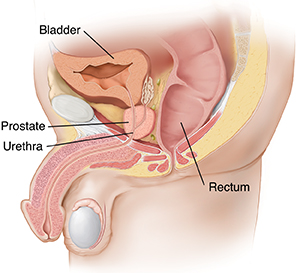Chronic Prostatitis/Chronic Pelvic Pain Syndrome (CP/CPPS)
Chronic prostatitis/chronic pelvic pain syndrome (CP/CPPS) is ongoing pain in the area of the prostate gland. CP/CPPS is the most common types of prostatitis. The prostate gland is part of the reproductive system for men. It sits just below the bladder and around the urethra. The urethra is the tube that takes urine and semen out of the body. Symptoms such as pain and trouble urinating may come and go.
 |
| With a healthy prostate, urine flows easily through the urethra. |
What causes CP/CPPS?
The exact cause of CP/CPPS isn’t known. It may be caused by an infection that comes back again and again. It may be caused by inflammation of the prostate or nerves that supply the area. Muscle spasms in the pelvis may be a cause. Other causes of CP/CPPS may include:
In many cases, the cause isn’t clear.
What are the symptoms of CP/CPPS?
Some people don’t have symptoms. Or they may have symptoms that come and go. The symptoms can include:
How is CP/CPPS diagnosed?
Your healthcare provider will ask about your health history and your symptoms. They may give you a physical exam, including a rectal exam. Your urine, blood, and semen may be tested for bacteria or certain chemicals. In some cases, you may have other tests. You may have an ultrasound or a transrectal ultrasound-guided biopsy. This is done to take tiny pieces of tissue to examine under a microscope. Or you may have imaging tests such as a CT scan, MRI scan, or urodynamic studies that look at urine flow and other issues. These are done to look at your belly (abdomen) and pelvic areas.
How is CP/CPPS treated?
The goal of treatment is to help ease symptoms. Treatments can include:
-
Antibiotics
-
Anti-inflammatory or muscle-relaxing medicines
-
Alpha-blocker medicines, which relax the muscles in and around the gland
-
Sitz baths
-
Prostate massage
-
Dietary changes
-
Biofeedback
-
Surgery
-
Physical therapy for the pelvic floor muscles
-
Other medicines or herbal treatments
Online Medical Reviewer:
Marianne Fraser MSN RN
Online Medical Reviewer:
Raymond Kent Turley BSN MSN RN
Online Medical Reviewer:
Rita Sather RN
Date Last Reviewed:
10/1/2021
© 2000-2024 The StayWell Company, LLC. All rights reserved. This information is not intended as a substitute for professional medical care. Always follow your healthcare professional's instructions.